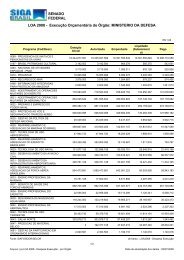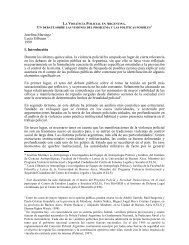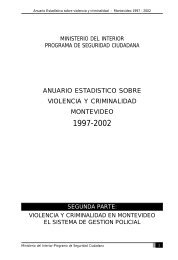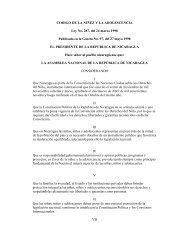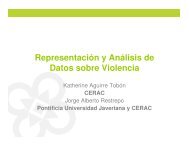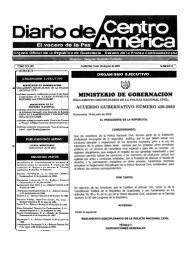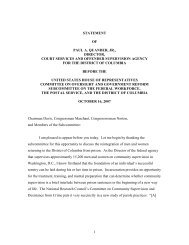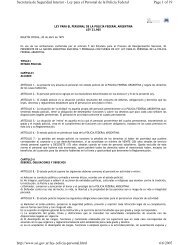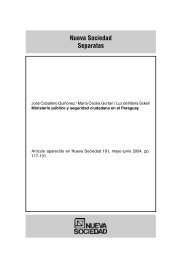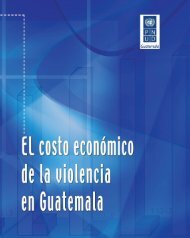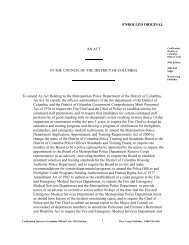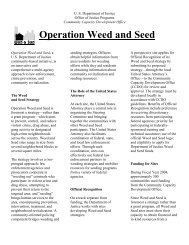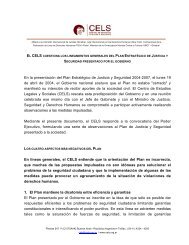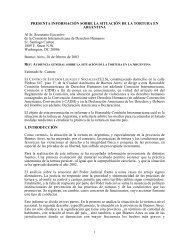Venezuela: The Life and Times of the Party System - Political ...
Venezuela: The Life and Times of the Party System - Political ...
Venezuela: The Life and Times of the Party System - Political ...
Create successful ePaper yourself
Turn your PDF publications into a flip-book with our unique Google optimized e-Paper software.
leaders; both are organized across <strong>the</strong> entire nation <strong>and</strong> at all levels; <strong>and</strong> both incorporate<br />
functional groups (like unions, students, or pr<strong>of</strong>essional associations) as wings in <strong>the</strong> party<br />
organization. <strong>The</strong>y also share an ability to mobilize important financial resources, partly as a<br />
result <strong>of</strong> <strong>the</strong>ir time in government but also through carefully cultivated links to business <strong>and</strong><br />
financial sectors. Each has <strong>the</strong> technical capacity to mount sophisticated <strong>and</strong> expensive<br />
campaigns <strong>and</strong> has shown itself able to change with <strong>the</strong> times, gradually replacing rallies <strong>and</strong><br />
parades with saturation <strong>of</strong> <strong>the</strong> mass media.<br />
Brief comment on three points will round out this review: <strong>the</strong> rise <strong>and</strong> fall <strong>of</strong> Unión<br />
Republicana Democrática (URD); <strong>the</strong> rise <strong>and</strong> fall <strong>of</strong> personalist vehicles; <strong>and</strong> <strong>the</strong> nature <strong>and</strong><br />
prospects <strong>of</strong> <strong>the</strong> Left. In 1958, URD was <strong>the</strong> third major party, along with AD <strong>and</strong> COPEI. It<br />
played a key role in cl<strong>and</strong>estine opposition to military rule <strong>and</strong> was a vital coalition partner during<br />
<strong>the</strong> first two AD governments (1959-63, 1963-68). URD had been founded during <strong>the</strong> trienio <strong>and</strong><br />
soon fell under <strong>the</strong> domination <strong>of</strong> Jovito Villalba, a former student leader <strong>and</strong> brilliant orator.<br />
Villalba’s personalistic control made organizational consolidation impossible: promising cadres<br />
were repeatedly driven out, <strong>and</strong> opportunities to build a durable party structure were wasted. In<br />
consequence, URD declined steadily after 1958 <strong>and</strong> for all practical purposes had disappeared<br />
by <strong>the</strong> late 1970s. <strong>The</strong> party’s electoral strength immediately after 1958 was in any event<br />
deceptive, for it rested more on c<strong>and</strong>idate appeal than on <strong>the</strong> party’s own efforts. In <strong>the</strong> 1958<br />
national elections, URD ran Admiral Wolfgang Larrazábal for president. Larrazábal was <strong>the</strong><br />
immensely popular ex-head <strong>of</strong> <strong>the</strong> Provisional Government that had replaced Perez Jimenez.<br />
URD never got close to those electoral levels again.<br />
Larrazábal himself later went on to establish his own party, <strong>and</strong> along with o<strong>the</strong>r popular<br />
figures built political vehicles that attracted considerable support in <strong>the</strong> decade after 1958.<br />
Without exception, <strong>the</strong>se disappeared after two elections. Indeed 1968 marks <strong>the</strong> last time such<br />
personalist vehicles (known in <strong>Venezuela</strong> as ‘electoral phenomena’) played a significant role.<br />
Attempts to build similar movements failed utterly in subsequent elections despite heavy financing<br />
<strong>and</strong> major media campaigns.<br />
<strong>The</strong> Left contains a number <strong>of</strong> small parties, none <strong>of</strong> which managed to take much more<br />
than 5 percent <strong>of</strong> <strong>the</strong> national vote until <strong>the</strong> most recent elections when a coalition dominated by<br />
<strong>the</strong> Movimiento al Socialismo (MAS) garnered about a tenth <strong>of</strong> <strong>the</strong> legislative vote <strong>and</strong> a similar<br />
proportion <strong>of</strong> seats in <strong>the</strong> Chamber <strong>of</strong> Deputies. <strong>The</strong> frustrations <strong>of</strong> <strong>the</strong> <strong>Venezuela</strong>n left have a<br />
long history. <strong>The</strong> Communist <strong>Party</strong> <strong>of</strong> <strong>Venezuela</strong> (PCV) is actually older than AD but has never<br />
recovered from losing <strong>the</strong> organizational wars <strong>of</strong> <strong>the</strong> 1940s. AD’s strong nationalism <strong>and</strong> flexible<br />
organization cut much more deeply than class unity <strong>and</strong> solidarity with <strong>the</strong> Soviet Union, which<br />
must have seemed awfully far away to average <strong>Venezuela</strong>ns <strong>of</strong> <strong>the</strong> day. Petk<strong>of</strong>f’s comment is<br />
apt:



